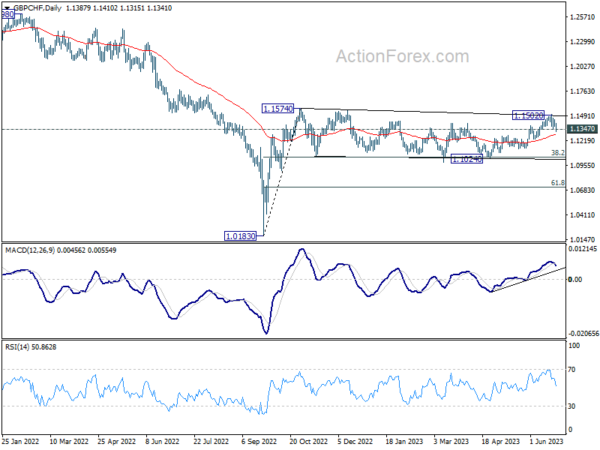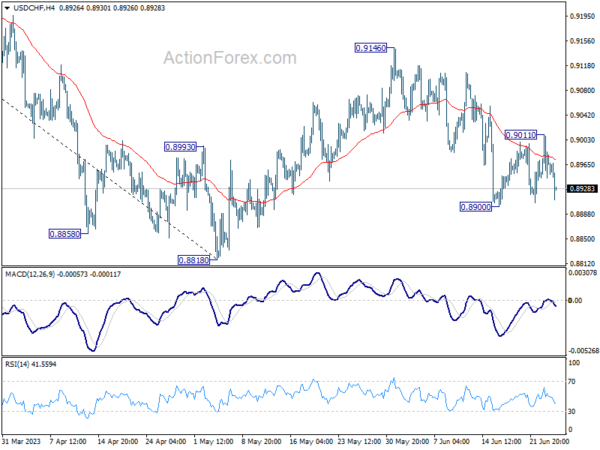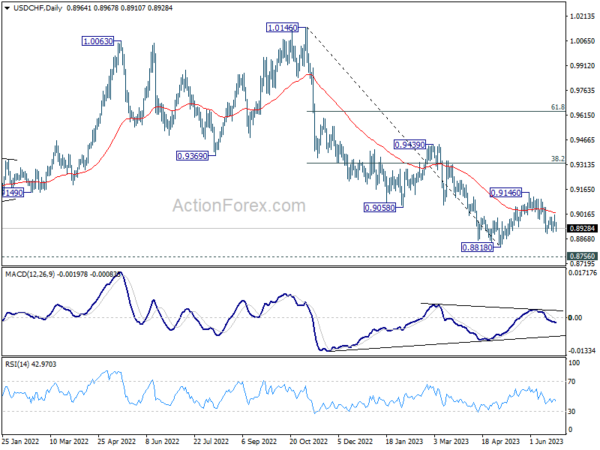Today sees Swiss Franc making notable gains due to an array of risk-averse factors at play. Disheartening data on German business sentiment fuels concerns about a protracted recession in the country and by extension, the broader Eurozone. While the weekend’s events surrounding Wagner mutiny may not have triggered a seismic response in the markets, the ensuing rise in geopolitical uncertainty is hard to overlook. This has prompted an inflow into safe-haven assets like government bonds, consequently driving down major European and US yields. Swiss Franc stands to gain from these dynamics, both as a direct beneficiary of its safe-haven status and from buying pressure against Euro.
In other currency market developments, New Zealand Dollar is also on the rise, ranking as the second strongest currency for the day, largely due a rally against Aussie Dollar. Conversely, Sterling is faring poorly as today’s weakest performer, with Dollar and Aussie trailing closely. Meanwhile, Yen’s performance is mixed, with verbal interventions from Japanese officials cushioning its recent decline.
Technically, GBP/CHF’s break of 1.1347 support today argues that the rebound from 1.1024 has completed at 1.1502, after rejection by 1.1574 resistance. The development also indicates that corrective pattern from 1.1574 is extending with another falling leg. Immediate focus is now on 55 D EMA (now at 1.1284). Firm break there will bring deeper fall towards 1.1024 cluster support (38.2% retracement of 1.0183 to 1.1574 at 1.1043).
In Europe, at the time of writing, FTSE is down -0.01%. DAX is down -0.12%. CAC is up 0.21%. Germany 10-year yield is down -0.0578 at 2.301. Earlier in Asia, Nikkei dropped -0.25%. Hong Kong HSI dropped -0.51%. China Shanghai SSE dropped -1.48%. Singapore Strait Times dropped -0.06%. Japan 10-year JGB yield is dropped -0.0183 to 0.353.
Bundesbank foresees difficult recovery for Germany, despite ended recession in Spring
In its latest monthly report, Bundesbank projected a somewhat gloomy economic outlook for Germany. The central bank expects the country’s GDP to shrink by a calendar-adjusted -0.3% for 2023, with subsequent growth projected at 1.2% in 2024 and 1.3% in 2025.
Characterizing the economic recovery as a laborious process, the Bundesbank pointed to the lingering impacts of the crises Germany has endured over the past three years. The nation’s recession, however, is anticipated to conclude in the spring quarter, with a slight increase in GDP predicted for April to June period.
Bundesbank anticipates that private consumption, a crucial component of economic health, will hit its lowest point and then begin to rebound. It highlighted that “Thanks to strongly rising wages, the real disposable incomes of private households are stabilizing despite inflation remaining very high.”
Germany Ifo down to 88.5, manufacturing weakness steering economy into turbulent waters
Germany Ifo Business Climate fell from 91.5 to 88.5 in June, below expectation of 91.2. Current Assessment Index dropped from 94.8 to 93.7, slightly above expectation of 93.5. Expectations Index tumbled further from 88.3 to 83.6, below expectation of 88.0.
By sector, manufacturing fell sharply from -0.1 to -6.6, lowest since November. Services dropped from 6.8 to 2.7. Trade edged down from -19.1 to -20.2. Construction decreased from -18.5 to -20.1.
Ifo said: “Sentiment in the German economy has clouded over considerably…Above all, the weakness in the manufacturing sector is steering the German economy into turbulent waters.”
SNB to pilot wholesale CBDC on SIX digital exchange
Switzerland’s central bank is making a foray into the realm of digital currencies. Thomas Jordan, Chairman of SNB, revealed plans to launch a wholesale central bank digital currency on the country’s SIX digital exchange, as part of a pilot.
In a conference in Zurich, Jordan clarified that the CBDC is not a mere experiment, but a step towards digitizing money. He asserted, “This is not just an experiment, it will be real money equivalent to bank reserves and the objective is to test real transactions with market participants.”
Despite the innovative move, Jordan voiced concerns regarding potential risks posed by retail CBDCs on the financial system. Moreover, he flagged the difficulty in controlling the use of such currencies. While not ruling out future introduction of retail CBDCs, he expressed a measure of caution, stating, “We do not exclude that we will never introduce retail [CBDCs] but nevertheless we are a little bit prudent at the moment.”
Japan’s top officials voice concern over ‘rapid and one-sided’ yen moves
In the face of Yen’s swift depreciation, top Japanese currency diplomat Masato Kanda expressed concern on Monday, describing the recent changes as “rapid and one-sided. He added that “We have all options available and we are not ruling out any options.”
Kanda, Vice Finance Minister for International Affairs, however, refrained from using the phrase “decisive action,” a term he used before Japan intervened in the currency market last year. This careful choice of words suggests that while officials are monitoring the situation, they may not be ready to step in just yet.
Adding to this sentiment, Finance Minister Shunichi Suzuki highlighted the ongoing vigilance of the government, stating that “we will continue to watch the forex market with a sense of urgency.”
In keeping with this sense of readiness, Suzuki assured that authorities would respond “appropriately” to any excessive currency swings, indicating that the government is primed to intervene if necessary.
BoJ opinions: Persistent monetary easing stance upheld, first call YCC Debate
Summary of opinions from BoJ Monetary Policy Meeting on June 15-16 shed light on the prevailing sentiment among policymakers regarding the nation’s current monetary easing stance.
Among the opinions expressed, there was an evident call for maintaining the current monetary easing policy to support rising wage growth, which was described as “the highest in around 30 years.”
Board members noted, “In order to achieve the price stability target of 2 percent in a sustainable and stable manner, price rises accompanied by wage increases, rather than those caused by cost-push factors, are necessary.”
The Bank was thus urged to “keep supporting such momentum for wage hikes through continuation of the current monetary easing.”
Significantly, there was a focus on the potential risks associated with premature policy revisions. It was stated, “It would be premature to revise monetary policy if it would hinder such developments,” referring to increasing wage and investment willingness among small and medium-sized firms.
Policymakers also warned against a “hasty policy change” that could miss the chance to achieve the price stability target.
However, one board member signaled a notable dissent, explicitly calling for an early discussion about tweaking the BoJ’s yield curve control (YCC) – a tool for monetary easing.
This marked the first time a BOJ summary displayed a member’s open expression for an early debate on modifying the YCC, hinting at possible future shifts in the Bank’s policy discussions.
USD/CHF Mid-Day Outlook
Daily Pivots: (S1) 0.8934; (P) 0.8973; (R1) 0.9010; More…
USD/CHF dips notably today but stays above 0.8900 temporary low. Intraday bias remains neutral first. Break of 0.8900 will resume the fall from 0.9146 to 0.8818 low or below. But for now, strong support is still expected from 0.8756 long term support to bring rebound. . On the upside, above 0.9011 will bring stronger rise towards 0.9146 resistance.
In the bigger picture, fall from 1.1046 (2022 high) is seen as a leg in the long term range pattern from 1.0342 (2016 high), which might have completed at 0.8818 already, just ahead of 0.8756 long term support. Sustained trading above 0.9058 support turned resistance should confirm medium term bottoming.
Economic Indicators Update
| GMT | Ccy | Events | Actual | Forecast | Previous | Revised |
|---|---|---|---|---|---|---|
| 23:50 | JPY | Corporate Service Price Index Y/Y May | 1.60% | 1.80% | 1.60% | |
| 23:50 | JPY | BoJ Summary of Opinions | ||||
| 08:00 | EUR | Germany IFO Business Climate Jun | 88.5 | 91.2 | 91.7 | 91.5 |
| 08:00 | EUR | Germany IFO Current Assessment Jun | 93.7 | 93.5 | 94.8 | |
| 08:00 | EUR | Germany IFO Expectations Jun | 83.6 | 88 | 88.6 | 88.3 |



